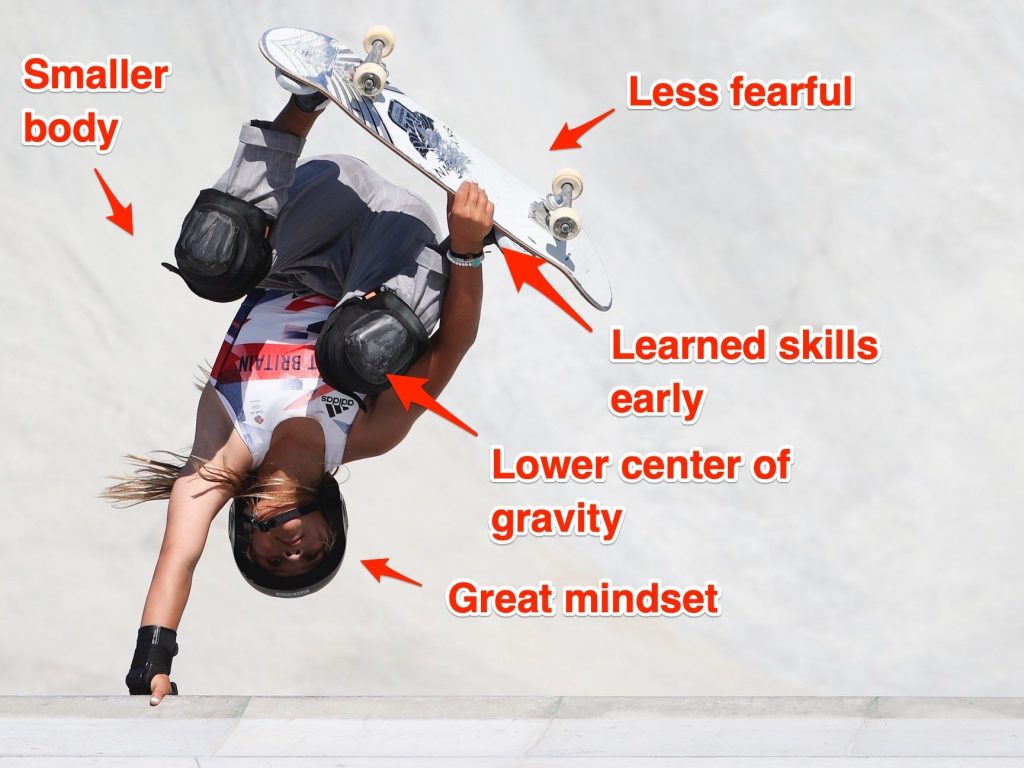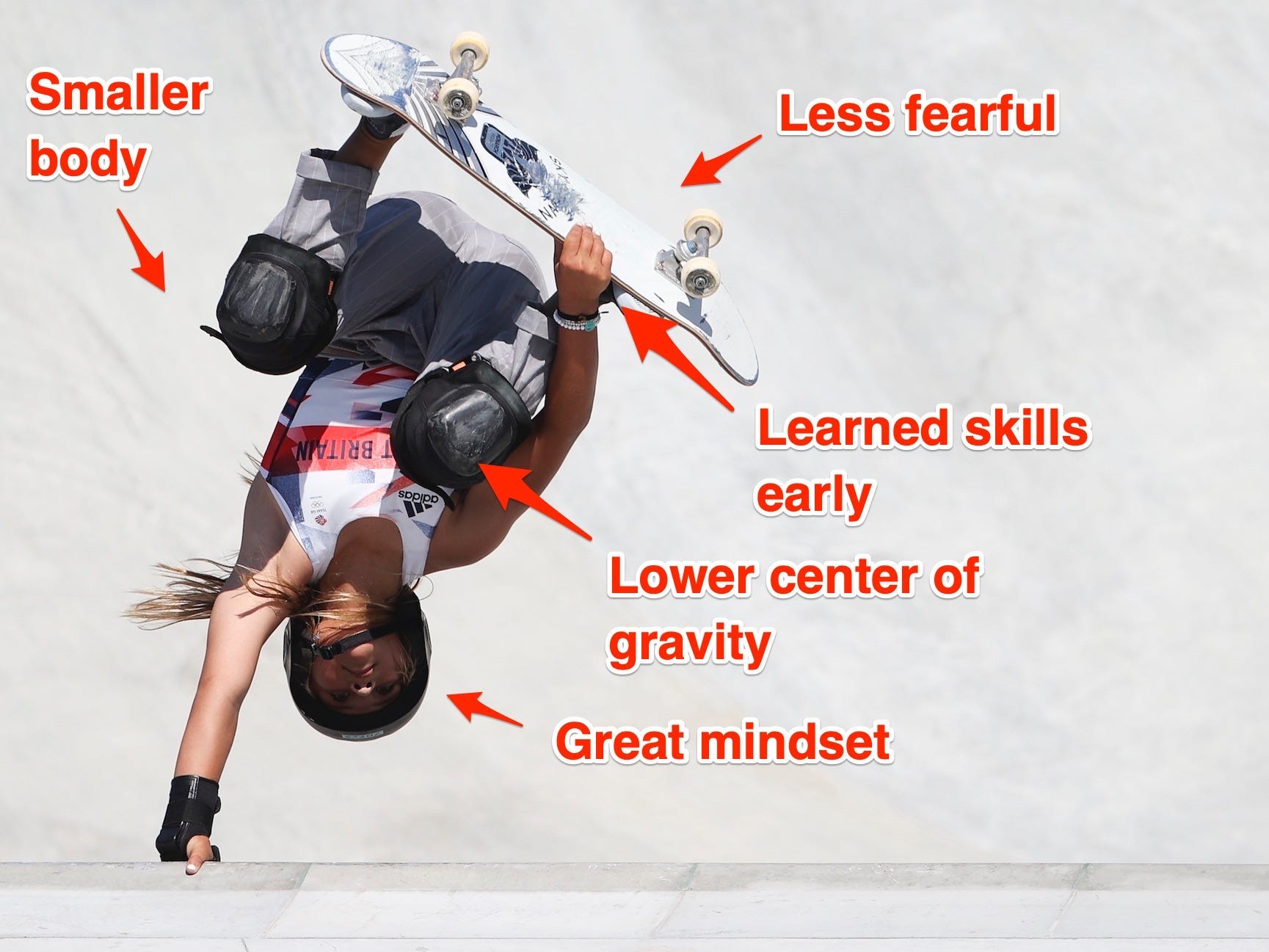
Jean Catuffe/Getty Images; Insider
- Young competitors swept the Olympic skateboarding events at the Tokyo games.
- Experts told Insider that being young can be a significant advantage for skateboarding.
- But as the sport becomes more competitive, this could all change, one expert said.
- Visit Insider's homepage for more stories.
At the Women's Park skateboarding champions at the Tokyo Olympics, the podium was two teens and a 12-year-old.
Bronze went to 13-year-old Sky Brown of Great Britain. Japan's Kokona Hiraki, 12, got silver and Sakura Yosozumi, 19, also of Japan, took gold.
"Skateboarding is a great and strange and amazing sport," Neil Ellis, head of engagement for UK sporting body Skateboard GB, told Insider. The Tokyo games were the first time it has been an Olympic event.
"At the Olympics, the peak of a competitive skateboarding, you had people competing at the age of 12 competing, but you also had people at the age of 46."
The success of young competitors in Tokyo is remarkable: here is a rundown of everyone under 20 who finished in the top 5 at an event:
Men's park: Keegan Palmer, Australia, 19 - 1st
Men's park, Kieran Woolley, Australia, 17 - 5th
Women's park: Sakura Yosozumi, Japan, 19 - 1st
Women's park: Kokona Hiraki, Japan, 12 - 2nd
Women's park: Sky Brown, Great Britain, 13 - 3rd
Women's park: Misugu Okamoto, Japan, 15 - 4th
Women's street: Momiji Nishiya, Japan, 13 - 1st
Women's street: Rayssa Leal, Brazil, 13 - 2nd
Women's street: Anup Soni, Japan, 16 - 3rd
(No teens won big in the men's street event.)
Insider spoke to experts about why this sport is well-suited to younger athletes who are still developing physically. Although it is an advantage now, one said that the sport could soon change to favor older skaters.
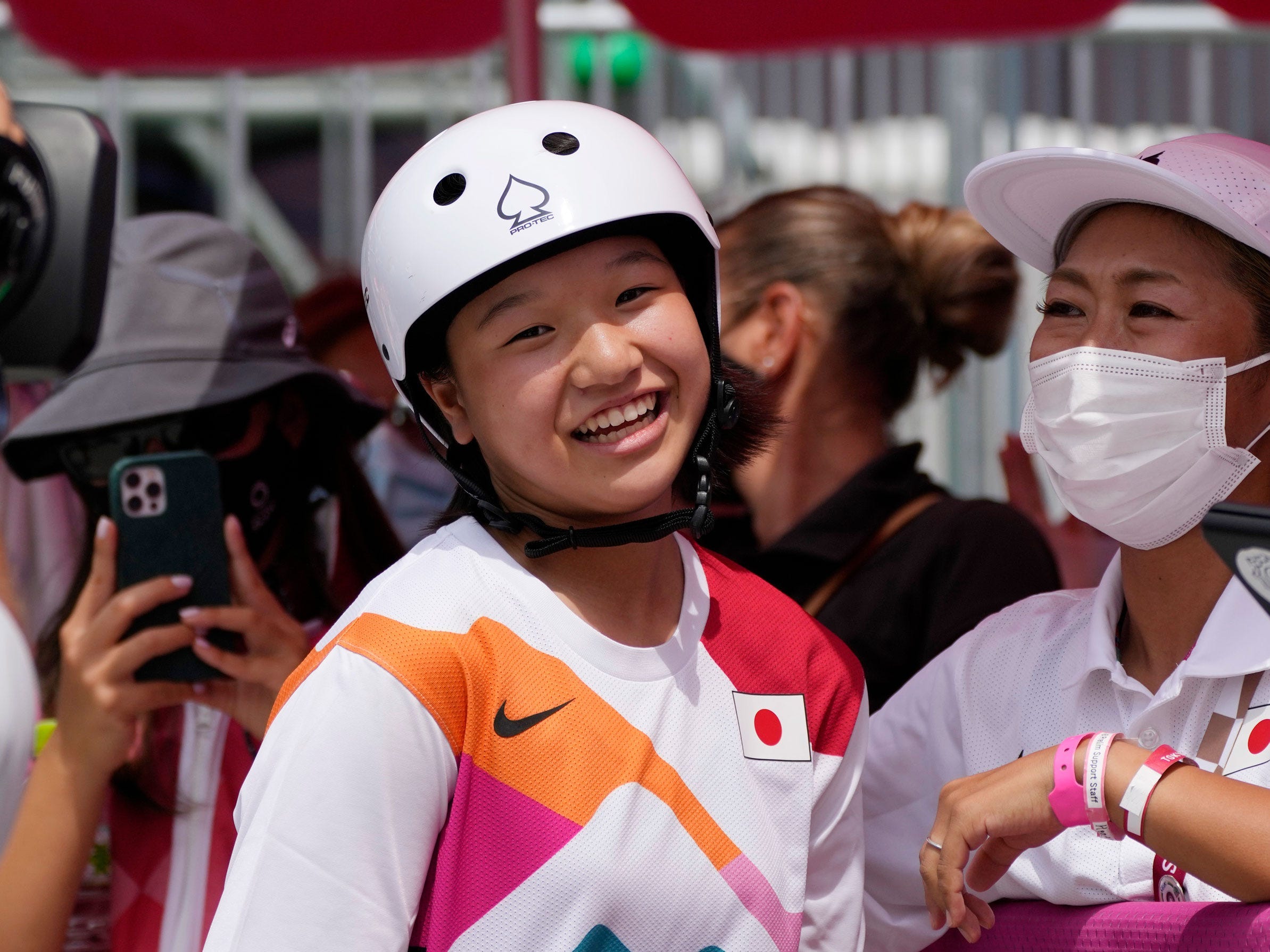
AP Photo/Ben Curtis
Being smaller can be an advantage
Having a smaller body can confer some physical advantages for a sport like skateboarding, said Anette (Peko) Hosoi, Associate Dean of the MIT School of Engineering and lead scientist on the MIT Sports Lab.
"For any tricks that require rotation, a more compact body will have a smaller moment of inertia," she told Insider.
This basically means it requires less energy for them to spin.
"The classic example is a figure skater spinning. When their arms are out (so they're "bigger") they spin more slowly; when they bring their arms in, they reduce their moment of inertia and they spin faster," she said.
The body's center of gravity is also closer to the board.
"That definitely helps with spin tricks because you're close to the ground, you're close to your board," Ellis said. "But it isn't everything, because, with a lot of spin tricks, people will grab the board" to bring the center of gravity closer to the board and make the spin easier.
As can be seen in Brown's routine below, rotation is a big part of skateboarding competitions.
Phil Price, a lecturer in Strength and Conditions at St. Mary's University in London, who also coaches athletes, told Insider that a slim frame helps as well as being short.
Think of comparing American football players to basketball players. Many football players have a wider rib cage and wider hips, which helps provide stability and that in turn helps developing force.
Basketball players, on the other hand, tend to have narrow hips and rib cages. That helps with the rotation at the hips, which makes them be more springy and react quickly, he said.
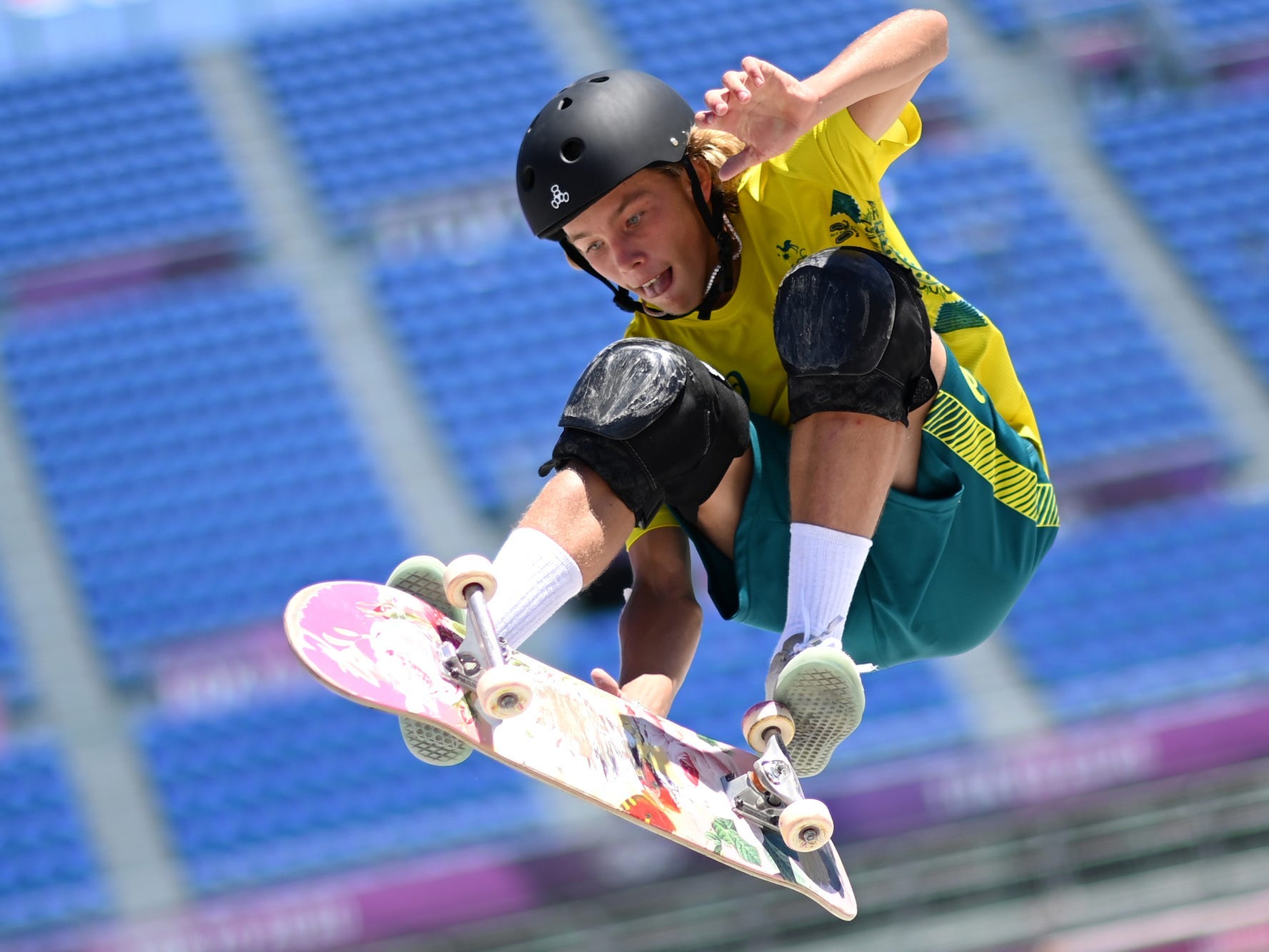
Marijan Murat/picture alliance via Getty Images
Older athletes are stronger. That can be a blessing and a curse.
According to Price, strength can be a limiting factor in a skill-based sport like skateboarding.
"You need to be strong enough - and then anything above that could be detrimental to performance," he said.
Because gravity plays a big part in the sport, and muscles are heavy, the strongest person won't necessarily be the best.
"Ultimately who makes it to the top? It isn't like all the stronger athletes are getting there or all the weaker athletes are getting there. It's how that athlete has the ability to find the way of performing that skill," he said, adding: "It's more of a problem-solving thing."
Strength, however, gives you speed and height while jumping.
To go faster, skateboarders can pump the skateboard, which is a way of accelerating without taking feet off the board, as can be seen in the video below (the relevant part starts at 1.08 minutes):
"Being larger probably helps with this," Hosoi said.
The stronger muscles you have, the higher you can go, said Ellis of Skateboard GB.
"You will notice that with a lot of younger skaters, they will be able to get the nice 360 spins or the 540 spins," he said. But they lack the strength to get high enough for further rotations.
Skateboarding lends itself to specializing early
There is a reason why younger athletes tend to be found in certain sports, Price said. They are sports where athletes can specialize early.
"If the sport is very skillful and doesn't necessarily require a huge type of physical output for it to be able to perform those skills, then those skills can be learned earlier."
In other sports that depend less on skill and more on power, like rugby or rowing, athletes have to develop their body before they can seriously start training.
But for sports like rock climbing and gymnastics, the skills can be learned early, at four, five or six.
"So by the time they're eight years old, they're incredibly competent. Give them another five, six years of practice, say that they're now 13, a bit like Sky [Brown], then all of a sudden they are at that elite level," Price said.
Another reason for the success of younger athletes in women's skateboard could simply be cultural. Until recently, girls only started picking up skateboarding at around 13 or 14, BBC commentator Ed Leigh told the i newspaper.
"So the skill acquisition process was taking longer," he said. "But girls have been starting to learn at four, five, six, the gender barrier has disappeared," Leigh said.
Younger athletes can quickly pick up new skills, Ellis said, which could give an advantage to those who started younger.
"The likes of Sky Brown, for example, joined the GB team a couple of years ago...the amount she's progressed in those two years is absolutely phenomenal. Whereas myself, a 39-year-old skateboarder, I would see myself, like, getting worse in that two-year period," he said.
"Bombette Martin [who is 15] was another great example. She was almost unknown to the world about a year ago," he said.
Martin was part of the UK's Women's park Olympics team this year.
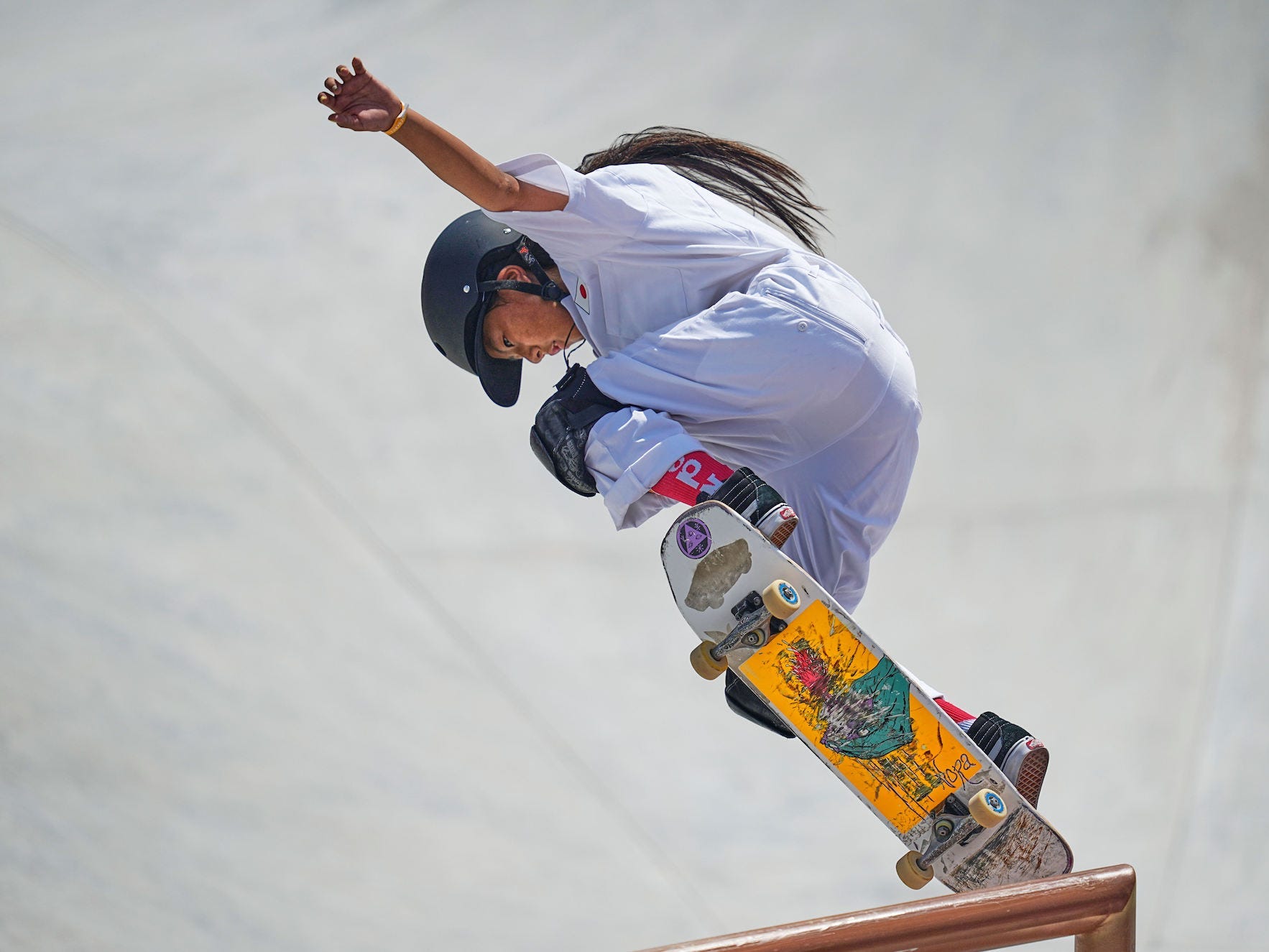
Ulrik Pedersen/NurPhoto via Getty Images
Mindset is key, and younger athletes are less scared of getting hurt
"There's a good saying: it doesn't matter how rich you are, you can't buy a trick, you have to pay with pain," Leigh, the BBC commentator, said.
Falling is an essential part of skills acquisition in skateboarding, so being able to recover quickly is vital.
Brown, the 13-year-old bronze medalist, had a terrible accident in 2020, leaving her with skull fractures, lacerated lungs, and a broken left arm.
"She is obviously someone with an excellent ability to avoid negative thoughts creeping in, to be able to get back to that level quickly," Price said. But beyond her natural ability, her youth probably also helped.
Recovering from an injury well enough to be in a competing state is 50% physical and 50% mental, Price said. Athletes are distinguished by their ability to keep negative thoughts out of their head and focus on constructive thoughts like "I will not get injured again," Price said.
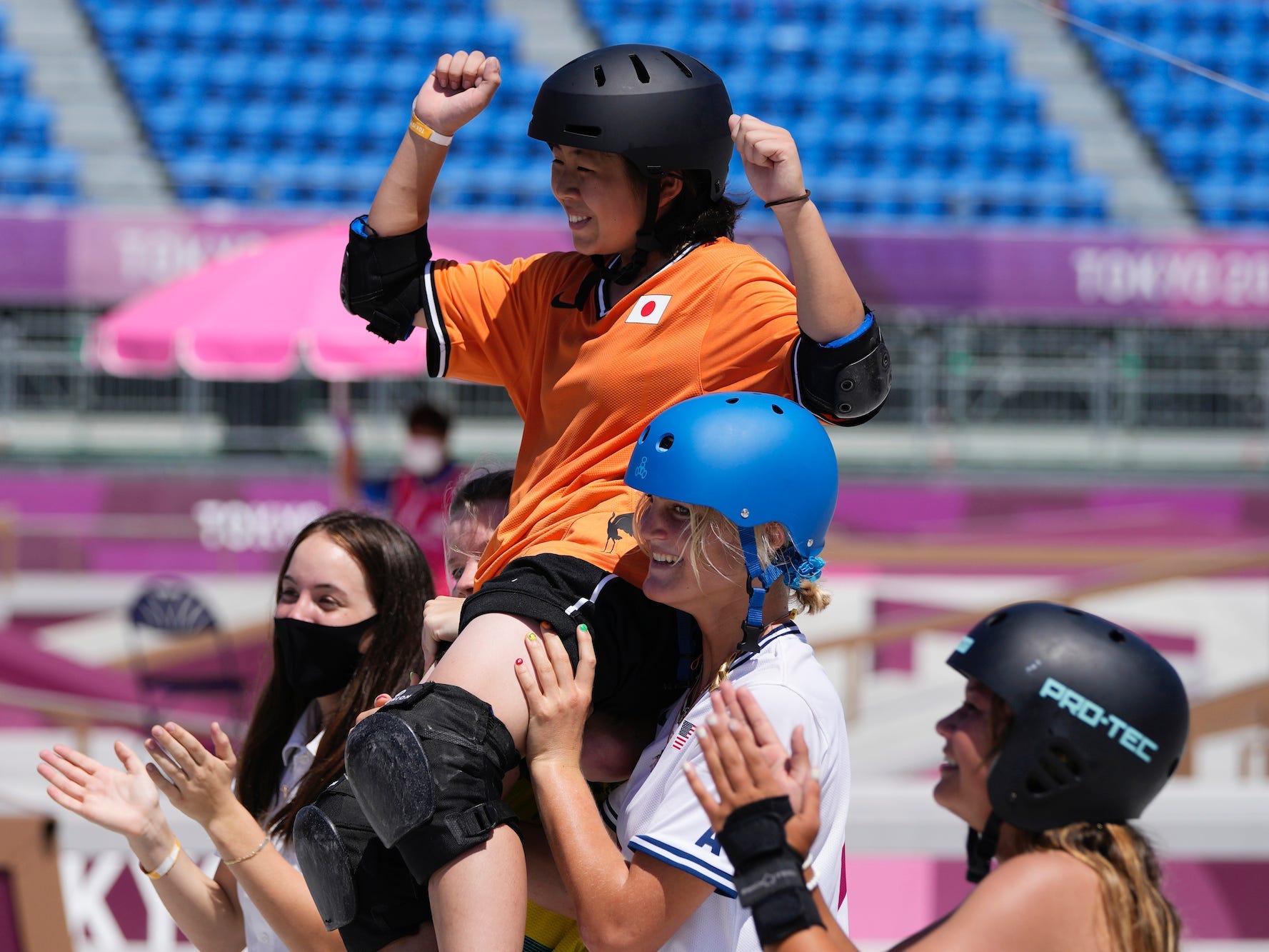
Ben Curtis/AP Images
Skating has great vibes, and competitors help each other
Another factor that might have played in the success of those on the podium is that skateboarding is not a sport that is heavily driven by competition.
"Every time I speak to a journalist, they're like always saying: 'can we speak to this person's coach... but in skateboarding generally, we don't have coaches," Ellis said. "In the US they do have coaches, but most people will just train with their friends."
A big part of learning in skateboarding is just peer-to-peer, and so training with the frontrunners can be a huge advantage.
"The top three Japanese girls and Sky Brown all skate together. They hang out together in the US, Sky goes over to Japan and skates with them," he said.
"That helps them progress," he said
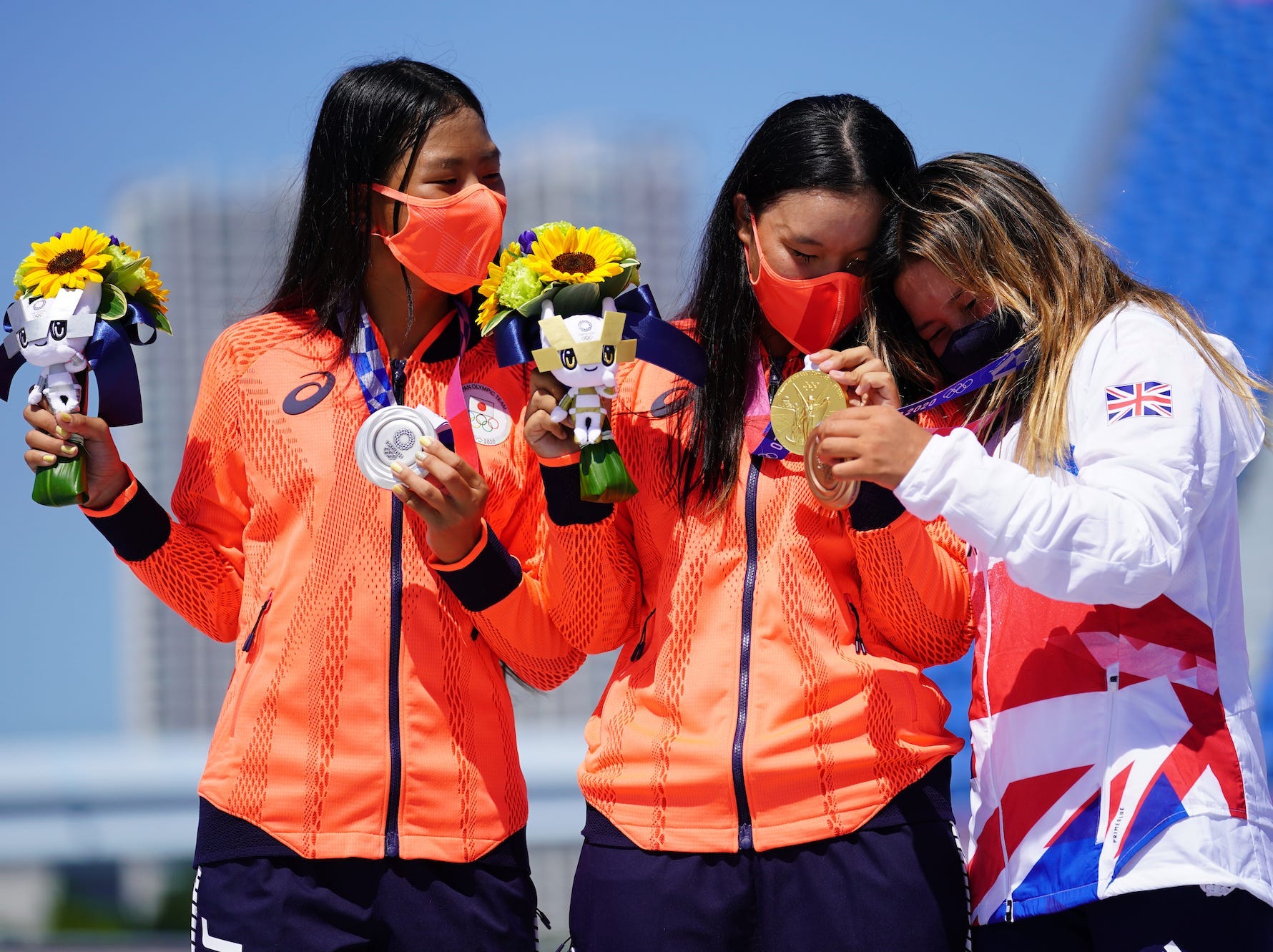
Adam Davy/PA Images via Getty Images
Elite contests could transform the sport
Competition isn't a huge part of skateboarding. Early-specialization sports like skateboarding tend to be more about hanging out with friends than victory at all costs.
What tends to happen as a sport becomes more popular is that science and money combine to optimize performance, Price said.
With better funding, coaches can seek out advanced methods to better understand performance, and in turn lengthen the length of time their competitors stay on top.
Price takes tennis as an example: in the 90s, younger athletes were winning grand slams. That was the case for likes of Boris Becker, who won at 17, and Martina Hingis, 15.
"Back in the day, people were: 'oh, you're 30. It's time to think about retiring the next few years'," Price said. But now elite tennis players compete well into their 30s.
"Will culture change, climbing or skateboarding the way it changed tennis, for example? It will be interesting to see where it goes."
